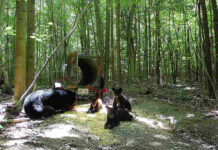SALEM, Ohio – An appeal bought Buckeye Egg farm hens three more months of laying time, but that may be all they get.
The newest closure schedule set by Ohio agriculture director Fred Dailey orders the farm to begin depopulation Nov. 20.
In a decision two weeks ago, the Ohio Environmental Review Appeals Commission upheld Dailey’s move to yank operation permits and close the farm.
The commission’s ruling comes from a July appeal of Dailey’s first attempt to shut the farm down.
Closure schedule. Dailey ordered Buckeye Egg Farm to begin closing two barns a week, starting with the Marseilles facilities in Wyandot County.
The next facility ordered closed is the Croton farms in Licking County, beginning with Layer Site No. 2, followed by Layer Site No. 1, the pullet sites, breeder site, hatchery, and remaining layer sites.
The third facility ordered closed is the Goshen farm located in Hardin County. The final facility ordered closed is the Mount Victory barns, also located in Hardin County.
The order states all barn closings must be complete by Oct. 22, 2004, and all manure must be removed by Jan. 30, 2005.
Closing barns includes removing all birds; cleaning and removing feed from feed bins and feed conveyor lines; and draining all water lines and shutting off all water service.
Farm’s reaction. Matt Doyle, Buckeye Egg’s chief financial officer, calls the closure order “unfortunate and misguided.”
Doyle said he believes the order disregards the farm’s impact on the community as well as its “demonstrated ability to operate effectively in recent months.”
Under new management, the farm hadn’t logged any insect or rodent outbreaks, manure or wastewater spills or contempt charges in the past year, according to Bill Leininger, operations manager.
Economically speaking, Doyle points to the farm’s payroll of more than 500 Ohioans, plus other contributions made to communities – namely paying taxes that fund community schools and supporting local businesses and family farmers.
“These groups will be among the first to experience the negative outcomes of this order,” he said.
Sending birds away. Doyle also expressed concerns about the feasibility of depopulating the barns so quickly.
“Compliance with the order itself, and the destruction of this number of birds, is a monumental task that may not be realistically achievable,” he said.
Farm operators have chosen rendering as their preferred method of disposal.
Leininger said in an earlier interview the farm would absolutely not consider bulldozing or burning barns as a method of disposal.
“That is definitely not something we want to do,” he stated.
An appeal? Farm officials are currently evaluating appeal and legal options. They plan to request an immediate stay of the order, which would put the closure on hold once again.
Buckeye Egg Farm is also negotiating the sale of the Croton and northern operations to new owners who currently have permit applications filed with the department of agriculture.
“The successful completing of that sale is a considerably more practical approach than closing these facilities,” Doyle said.
Buckeye Egg had more than 14 million laying hens and pullets, as well as a hatchery and breeding barn.
This spring and summer, in an effort to comply with poultry industry programs, the farm voluntarily increased cage space and reduced its total population to 9 million hens.
Buckeye Egg facilities produce 2.4 billion eggs each year. It is the biggest egg-producing farm in Ohio and fourth largest in the nation.
(Reporter Andrea Myers welcomes reader feedback by phone at 1-800-837-3419, ext. 22, or by e-mail at amyers@farmanddairy.com.)
Get 4 Weeks of Farm and Dairy Home Delivered









